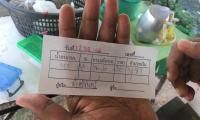Advancing livelihoods of smallholder rubber farmers in Thailand

Rubber tapper at a latex collection centre showing payment slip for a day’s work.
Over 1,000 smallholders in southern Thailand earn their living from farming and tapping rubber latex for condom production by consumer goods giant, Reckitt. The farmers usually work only a couple of hectares and face social and environmental challenges affecting their livelihoods.
Rubber trees are susceptible to disease, land rights disputes, increasingly acute weather patterns, and low natural rubber prices. All these factors constitute risks to the farmers’ incomes and their right to an adequate standard of living.
The impact of low natural rubber prices on small farmers was one of several observations made by the Institute in a human rights impact assessment (HRIA). Reckitt, wanting to better understand the human rights impacts in its Thai value chain, commissioned the impact assessment in 2019. The Institute conducted the HRIA in collaboration with the Earthworm Foundation. Together, they focused on human rights impacts associated with Reckitt’s condom brand Durex.
Reckitt joins Fair Rubber Association
To support the long-term quality and supply of latex, Reckitt has worked with latex smallholder farmers in Thailand for several years, strengthening livelihoods and farming practices. The assessment, published in March 2021, highlighted the ongoing challenge which low natural rubber prices pose to the farmers.
To tackle this challenge and strengthen their existing programmes, Reckitt joined the Fair Rubber Association in April 2021. This means that some 1,000 smallholder rubber farmers, tappers, and plantation workers will benefit from fair trade in natural rubber.
The Institute’s report recommends that Reckitt explore different models for improving living conditions in farming communities. These could include fixed minimum income levels for rubber farmers and tappers, especially important when the global market price is low.
